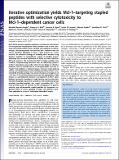Iterative optimization yields Mcl-1–targeting stapled peptides with selective cytotoxicity to Mcl-1–dependent cancer cells
Author(s)
Bird, Gregory H.; Ryan, Jeremy A.; Godes, Marina; Pritz, Jonathan R.; Letai, Anthony; Walensky, Loren D.; Rezaei Araghi, Raheleh; Jenson, Justin Michael; Grant, Robert A; Keating, Amy E.; ... Show more Show less
DownloadE886.full.pdf (1.195Mb)
PUBLISHER_POLICY
Publisher Policy
Article is made available in accordance with the publisher's policy and may be subject to US copyright law. Please refer to the publisher's site for terms of use.
Terms of use
Metadata
Show full item recordAbstract
Bcl-2 family proteins regulate apoptosis, and aberrant interactions of overexpressed antiapoptotic family members such as Mcl-1 promote cell transformation, cancer survival, and resistance to chemotherapy. Discovering potent and selective Mcl-1 inhibitors that can relieve apoptotic blockades is thus a high priority for cancer research. An attractive strategy for disabling Mcl-1 involves using designer peptides to competitively engage its binding groove, mimicking the structural mechanism of action of native sensitizer BH3-only proteins. We transformed Mcl-1–binding peptides into α-helical, cell-penetrating constructs that are selectively cytotoxic to Mcl-1–dependent cancer cells. Critical to the design of effective inhibitors was our introduction of an all-hydrocarbon cross-link or “staple” that stabilizes α-helical structure, increases target binding affinity, and independently confers binding specificity for Mcl-1 over related Bcl-2 family paralogs. Two crystal structures of complexes at 1.4 Å and 1.9 Å resolution demonstrate how the hydrophobic staple induces an unanticipated structural rearrangement in Mcl-1 upon binding. Systematic sampling of staple location and iterative optimization of peptide sequence in accordance with established design principles provided peptides that target intracellular Mcl-1. This work provides proof of concept for the development of potent, selective, and cell-permeable stapled peptides for therapeutic targeting of Mcl-1 in cancer, applying a design and validation work-flow applicable to a host of challenging biomedical targets. Keywords: stapled peptide; Mcl-1; apoptosis; BH3 mimetic; inhibitor
Date issued
2018-01Department
Massachusetts Institute of Technology. Department of Biological Engineering; Massachusetts Institute of Technology. Department of BiologyJournal
Proceedings of the National Academy of Sciences
Publisher
National Academy of Sciences (U.S.)
Citation
Rezaei Araghi et al. “Iterative Optimization Yields Mcl-1–targeting Stapled Peptides with Selective Cytotoxicity to Mcl-1–dependent Cancer Cells.” Proceedings of the National Academy of Sciences 115, 5 (January 2018): E886–E895 © National Academy of Sciences (U.S.)
Version: Final published version
ISSN
0027-8424
1091-6490